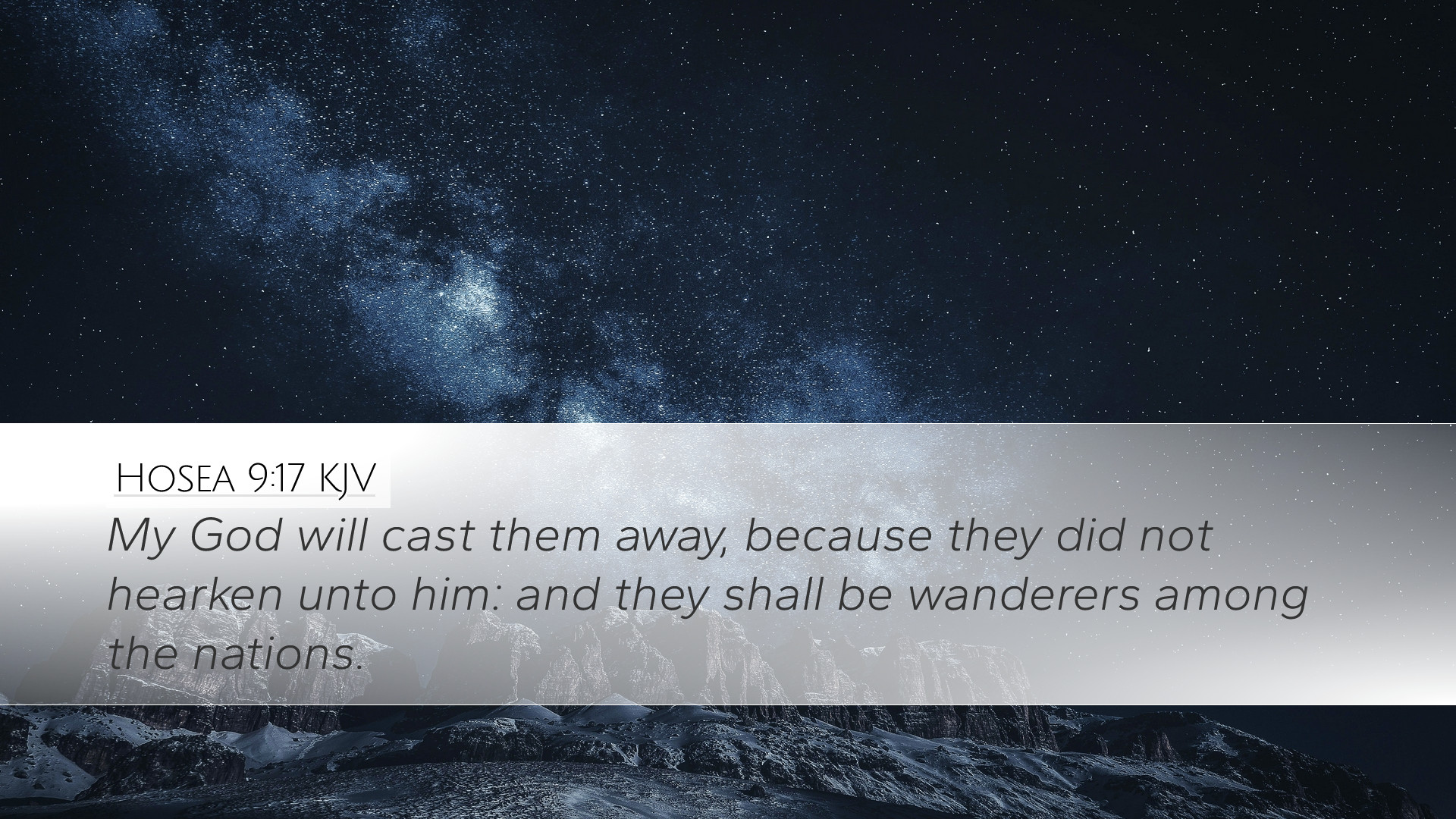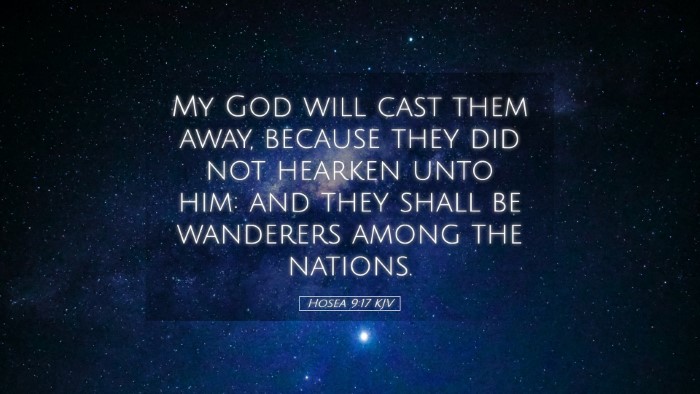Old Testament
Genesis Exodus Leviticus Numbers Deuteronomy Joshua Judges Ruth 1 Samuel 2 Samuel 1 Kings 2 Kings 1 Chronicles 2 Chronicles Ezra Nehemiah Esther Job Psalms Proverbs Ecclesiastes Song of Solomon Isaiah Jeremiah Lamentations Ezekiel Daniel Hosea Joel Amos Obadiah Jonah Micah Nahum Habakkuk Zephaniah Haggai Zechariah MalachiHosea 9:17
Hosea 9:17 KJV
My God will cast them away, because they did not hearken unto him: and they shall be wanderers among the nations.
Hosea 9:17 Bible Commentary
Commentary on Hosea 9:17
Verse: "My God will cast them away, because they did not hearken unto him: and they shall be wanderers among the nations."
Introduction
The verse Hosea 9:17 speaks to the severe consequences of Israel's disobedience and spiritual decline. The prophet Hosea, inspired by God, addresses the nation of Israel, emphasizing their unfaithfulness and the resultant divine judgment. The following commentary draws from the insights of Matthew Henry, Albert Barnes, and Adam Clarke to provide a comprehensive understanding for pastors, students, and scholars of biblical text.
Contextual Overview
The Book of Hosea is a profound testament to Israel's tumultuous relationship with God. Hosea, acting as both a prophet and a moral witness, conveys God's persistent love despite Israel’s repeated infidelities. As we delve into Hosea 9, it is essential to recognize that the broader context reflects on Israel's sinfulness, particularly their idolatry and alliances with foreign nations. This verse underscores the ultimate consequence of their choices—being cast away from the favor of God.
Exposition of Key Themes
- Divine Abandonment:
Matthew Henry notes that the abandonment of Israel signifies not just rejection but an intensification of their folly. God’s casting away is both a judgment and a form of divine justice for disregarding His commands. The metaphor of "casting away" suggests a definitive decision by God rather than a mere loss of favor.
- Failure to Heed God's Voice:
Albert Barnes emphasizes that Israel's fate ensues from their unwillingness to listen to Divine counsel. The phrase "did not hearken unto him" encapsulates the idea that their persistent disobedience effectively sealed their fate. Spiritual stubbornness carries grave consequences.
- Wanderers Among the Nations:
Adam Clarke elaborates on the term "wanderers," suggesting that this denotes a state of spiritual desolation. Israel, once a chosen nation, will find themselves in a foreign land, indicative of their severed relationship with God. The imagery of wandering speaks to instability and loss of identity as God’s people.
Theological Implications
The theological implications of Hosea 9:17 resonate with modern audiences as they confront the realities of spiritual neglect. The message relayed through Hosea is eternally relevant, offering a stark reminder of the following concepts:
- Judgment vs. Grace:
While God’s judgment is pronounced in this verse, the overall narrative of Hosea also highlights His extraordinary grace. Even amidst divine judgment, the potential for repentance and restoration remains open. It presents a duality of God’s character that is essential for theological discourse.
- Sovereignty and Human Responsibility:
The term "My God will cast them away" illustrates the sovereignty of God over human affairs. However, it also stresses that human choices lead to divine consequences—an essential consideration for the Church today.
- The Role of Idolatry:
The context surrounding this verse highlights the dangers of idolatry. Israel's approach to worship and allegiance to foreign gods ultimately led to their spiritual demise. Thus, it calls for self-reflection among believers about their own lives and priorities.
Application for Today
Pastors and leaders can draw several applications from this text:
-
Call to Repentance:
It serves as an urgent reminder for individuals and communities to heed the call to repentance. The grace of God continues to beckon His people back to Himself, even when they have strayed.
-
Awareness of Spiritual Decline:
Churches should remain vigilant against the subtle encroachments of idolatry and worldly influences, ensuring that they remain faithful to the teachings of scripture.
-
Importance of Listening to God:
There is a strong emphasis on the necessity of listening to God's voice and guidance in all matters of life, a theme that should be continually fostered in teaching settings.
-
Encouragement to the Wayward:
For those feeling far from God, there is hope. While Hosea speaks of judgment, it ultimately hinges on God's unchanging love and desire to restore His people.
Conclusion
Hosea 9:17 encapsulates a crucial moment in the narrative of Israel, pointing towards both the heart of God’s just character and the dire consequences of unfaithfulness. In this commentary, we see a call that transcends history, urging each generation to remain steadfast in God's covenant. By synthesizing insights from renowned theologians, believers today are reminded of the seriousness of heeding God's voice and the profound implications of wandering from His presence. The words of Hosea compel us to embrace faithfulness, knowing that while consequences may arise from disobedience, hope remains firmly anchored in God’s enduring love.


